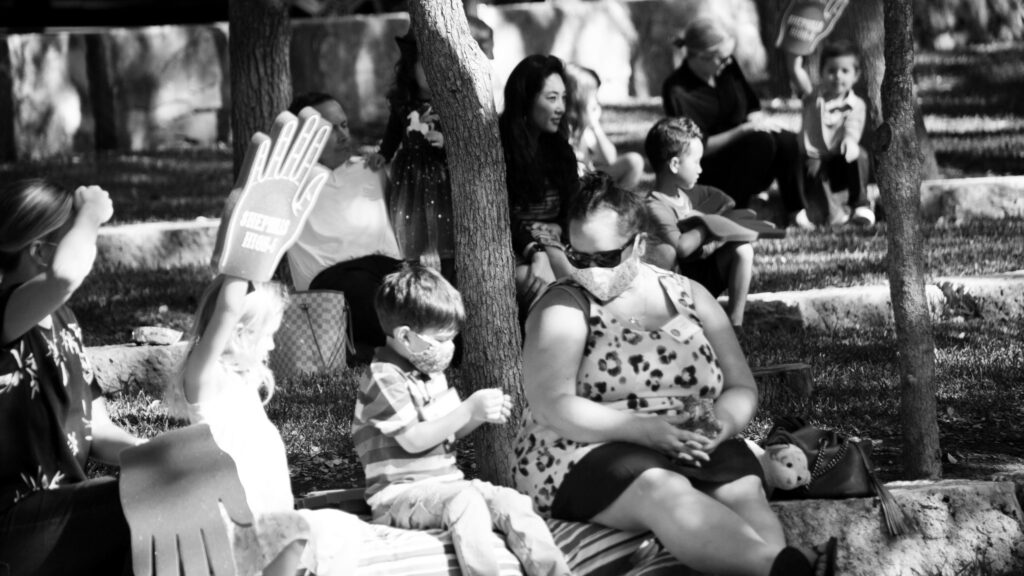In This Together

October 3-8, 2022
Scripture: Romans 12:9-16, NRSV
Let love be genuine; hate what is evil, hold fast to what is good; love one another with mutual affection; outdo one another in showing honor. Do not lag in zeal, be ardent in spirit, serve the Lord. Rejoice in hope, be patient in suffering, persevere in prayer. Contribute to the needs of the saints; extend hospitality to strangers.
Bless those who persecute you; bless and do not curse them. Rejoice with those who rejoice, weep with those who weep. Live in harmony with one another; do not be haughty, but associate with the lowly; do not claim to be wiser than you are.
MONDAY 10.3.22 Galatians 3:26-4:7
Christian community: a family with one loving parent
Shepherd of the Hills is seeking to engage and welcome all people. Because our purpose is rooted in Jesus’ and his followers’ example, our location pastors spoke yesterday about building community. Jesus’ followers stood out: “Only a minority of groups even claimed to surmount ethnic and class divides…. Early Christians…proved distinctive in challenging class (slave vs. free) and often gender prejudice.” *
- Christians who call each other “brother” or “sister” may sound quaint. But today’s reading said we’re all members of God’s spiritual family (and therefore each other’s). Do you ever struggle to accept believers in Jesus who are ethnically, culturally or denominationally different from you? How about neighbors, fellow students or co-workers from a different ethnic, cultural or national background than yours? What helps you to view all people as beloved children of God?
- Paul used a word for God so unexpected that most English Bibles just use its Aramaic form: abba.
It was “a respectful but intimate way to address one’s father….[it] seems to have been unique to Jesus (until adopted by his followers; Romans 8:15; Galatians 4:6).” ** The word’s sense was closer to “Dad” than “Father.” Do you see God more as a grim, distant force in your life or a God who yearns to be in relationship? How does community with God define our community?
Prayer: God, you are my Creator and Lord, worthy of awe and respect. And you are my abba, loving, caring, and worthy of my full trust. Teach me how to always feel secure that you are “for” me. Amen.
* HarperCollins Christian Publishing. NIV, Cultural Backgrounds Study Bible, eBook: Bringing to Life the Ancient World of Scripture (Kindle Locations 266575-266578). Zondervan. Kindle Edition.
** HarperCollins Christian Publishing. NIV, Cultural Backgrounds Study Bible, eBook: Bringing to Life the Ancient World of Scripture (Kindle Locations 227320-227323). Zondervan. Kindle Edition
TUESDAY 10.4.22 Acts 1:4-8, 8:4-17, 25
Jesus’ followers built community with Samaritans
Hatred and distrust between Israelites and neighboring Samaritans went back over 500 years, to
Israel’s return from exile in Babylon (cf. Ezra 4:1–5). So it was striking that the early Christians matter-of-factly obeyed Jesus’ mandate to preach in Samaria, and openly built community with these former enemies. They rejoiced that God welcomed those past enemies as part of God’s family.
- Jesus treated Samaritans with respect and compassion (cf. e.g. Luke 17:11-19, John 4:4-6, 39–41). How did his example first startle, and then prepare the apostles for the time when they reached out to and accepted Samaritans? In what ways are you modeling building community across any racial, cultural and inter-faith lines for your family, your friends, and your business associates?
- Early Christians didn’t build community because they were unusually open-minded. When the Holy Spirit showed that God freely accepted the Samaritans, they joined in God’s mission. Later some criticized Peter for baptizing Roman soldiers. He asked, “If God gave them the same gift he gave us who believed in the Lord Jesus Christ, then who am I? Could I stand in God’s way?” (Acts 11:17) Can you follow God’s lead by reaching out to anyone the Holy Spirit places in your path?
Prayer: Lord God, it feels natural, in so many ways, for me to divide the human family into “us” and “them.” Teach me what you taught the apostles—that in your eyes, there is only “us.” Amen.
WEDNESDAY 10.5.22 Ephesians 2:11-20
God’s household, with Jesus as the cornerstone
There was an actual Temple barrier in Jerusalem. “Interpretations of purity laws resulted in Gentiles being excluded from the court of Israel (for Jewish men) and even the less pure court of women (for Jewish women). Christians in Ephesus would know that Paul was in Roman custody because he had been accused of bringing an Ephesian Gentile beyond the temple’s outer court (Acts 21:27–29).” * Christ came to bring us together in the church community—no walls, no strangers or outcasts.
- “Christ is our peace….We both have access to the Father through Christ by the one Spirit.” What difference do you see between peace as a mere human effort based on “splitting differences” or balancing interests, and peace based on who Jesus is and who you are in him? Which is more lasting? How can you make Jesus the “chief cornerstone” of your community experience?
- Ephesians said that on the cross Jesus broke down the walls of hatred and distrust that separate people. In a global society, we all see and hear differences between people that trigger hostility in our heart. Who do you find it hard to like or to trust? How does it affect your feelings when you realize that Jesus died for them, too? How can Jesus’ grace toward you help make you willing to tackle the hard work of changing long-standing prejudices, feelings and actions?
Prayer: Lord Jesus, you are God’s anointed one, the Prince of Peace. Tear down any barriers of hatred in my heart that keep me from caring about all your beloved children. Amen.
* HarperCollins Christian Publishing. NIV, Cultural Backgrounds Study Bible, eBook: Bringing to Life the Ancient World of Scripture (Kindle Locations 268229-268232). Zondervan. Kindle Edition.
THURSDAY 10.6.22 1 Corinthians 12:3-13, Ephesians 4:1-6
“One Lord, One Faith, One Baptism”
We’re different in many ways. But Paul told his converts that diversity was God’s plan. The members of God’s family of believers are not interchangeable. Like our physical body parts, we are different but work together. What unites us in community is that we all follow one Lord, we’re all led by one Spirit, and with all our different backgrounds and gifts, we all form one body—the Body of Christ. Both Corinthians and Ephesians identified that “one Lord” as the foundation of God’s new community.
- It is fact, not opinion, that people from many different backgrounds all love and serve the same Lord—Jesus Christ. It is also fact, not opinion, that those who love and serve the same God do so in many varying ways. How can you subdue forces in your thinking that try to make the differences into walls of separation and mistrust? How can you “make the effort to preserve the unity of the Spirit” by focusing on the One we serve together as a community?
- In your church, your family, your workplace and your civic community do you notice the ways that the differences between people bring depth, richness and strength (even when they may also pose challenges)? How can valuing, honoring and celebrating the strength that grows from our differences help to keep us from building community-destroying walls of separation?
Prayer: Lord, keep me growing toward maturity in you. Help me sink the roots of my faith ever more deeply into your eternal wisdom, and to use my gifts in ways that serve your kingdom. Amen.
FRIDAY 10.7.22 II Corinthians 8:9-15
Building community across economic divides
Early Christian community building didn’t bridge only ethnic and gender divides. It also spanned the vast gaps between the privileged wealthy and the abused poor. Paul collected funds from people who were doing well to help Christians suffering poverty in Jerusalem. Christ’s example and ideal for God’s people was deep mutual concern and burden-sharing, the opposite of “class warfare.” Paul urged giving not just to pay bills, but to honor God as ultimate owner and source of all they had. • “Your plenty will supply what they need,” Paul wrote to the relatively wealthy Corinthian Christians. Do you tend to see yourself more as someone who has plenty or as someone in need? Has the pandemic’s impact changed that perception in any way? How does the truth that we’re one human community under God reshape how you see economic issues of plenty and need?
• At the end of this passage, Paul referred to the story of the Israelites receiving manna to feed them in the wilderness (cf. Exodus 16:15–18). Every Israelite, Exodus said, gathered only as much manna (food) as needed. No one tried to “corner the market.” Is there a principle in that story that applies to life today? Do you believe Paul’s goal of economic equality is out of date in the 21st century, or worth living out in counter-cultural ways?
Prayer: Lord Jesus, I find the word “mine” so appealing, but it can make me grasp the assets you lend me in trust much too tightly. Teach me how to keep growing into your generous spirit of sharing. Amen.
SATURDAY 10.8.22 Ephesians 1:12-14, Revelation 21:1-5
Down payment now, full community inheritance to come
Jesus wasn’t with us for just a few first century years. He vowed to be with us every day in the Holy Spirit (cf. John 14:16–18). Ephesians 1:14 used the Greek word arrabon (“down payment”). Scholar William Barclay said, “There are many Greek commercial documents still extant in which the word occurs. A woman sells a cow and receives so many drachmae as arrabōn. Some dancing girls are hired for a public entertainment and are paid so much in advance. Paul is saying the experience of the Holy Spirit which we have in this world is a foretaste of heaven; and it is the guarantee that someday we will enter into full possession of the blessedness of God.” * Revelation’s ending said Jesus made God’s presence with us an eternal reality. As a Christian community we trust that THIS is where history is going: “He will dwell with them, and they will be his peoples. God himself will be with them as their God. He will wipe away every tear from their eyes.”
• Jesus told his followers to “go and make disciples of all nations” (Matthew 28:19), even in the hostile Roman Empire. And they did. Paul wrote that Christians mourn, but not like those “who don’t have any hope” (1 Thessalonians 4:13). Ephesians said the best worship, praise, service or caring times the Holy Spirit gives us are God’s “down payment,” signs that full renewal will come. What are some ways you are experiencing the down payment of life in the Spirit? Are you freer and less a slave today than before you met Jesus? How can you join with other Christians to make our community an attractive preview of the eternal love, joy and grace that await us? The exiled apostle John wrote of a vision that promised God’s people a splendid future with God. He invited everyone to choose that future: “Let the one who is thirsty come! Let the one who wishes receive life-giving water as a gift” (Revelation 22:17). Have you said yes to that invitation?
Prayer: O Lord, how I long for that day when “death will be no more. There will be no mourning, crying, or pain.” In the words that end Revelation, I pray “Even so, come, Lord Jesus.” Amen.

